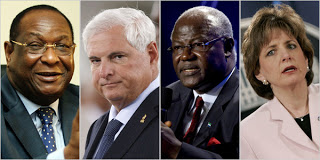 |
| Getty images |
Ginger Thompson and Scott Shane
The New York Times
WASHINGTON — The Drug Enforcement Administration has been transformed into a global intelligence organization with a reach that extends far beyond narcotics, and an eavesdropping operation so expansive it has to fend off foreign politicians who want to use it against their political enemies, according to secret diplomatic cables.
In far greater detail than previously seen, the cables, from the cache obtained by WikiLeaks and made available to some news organizations, offer glimpses of drug agents balancing diplomacy and law enforcement in places where it can be hard to tell the politicians from the traffickers, and where drug rings are themselves mini-states whose wealth and violence permit them to run roughshod over struggling governments.
Diplomats recorded unforgettable vignettes from the largely unseen war on drugs:
¶In Panama, an urgent BlackBerry message from the president to the American ambassador demanded that the D.E.A. go after his political enemies: “I need help with tapping phones.”
¶In Sierra Leone, a major cocaine-trafficking prosecution was almost upended by the attorney general’s attempt to solicit $2.5 million in bribes.
¶In Guinea, the country’s biggest narcotics kingpin turned out to be the president’s son, and diplomats discovered that before the police destroyed a huge narcotics seizure, the drugs had been replaced by flour.
¶Leaders of Mexico’s beleaguered military issued private pleas for closer collaboration with the drug agency, confessing that they had little faith in their own country’s police forces.
¶Cables from Myanmar, the target of strict United States sanctions, describe the drug agency informants’ reporting both on how the military junta enriches itself with drug money and on the political activities of the junta’s opponents.
Officials of the D.E.A. and the State Department declined to discuss what they said was information that should never have been made public.
Like many of the cables made public in recent weeks, those describing the drug war do not offer large disclosures. Rather, it is the details that add up to a clearer picture of the corrupting influence of big traffickers, the tricky game of figuring out which foreign officials are actually controlled by drug lords, and the story of how an entrepreneurial agency operating in the shadows of the F.B.I. has become something more than a drug agency. The D.E.A. now has 87 offices in 63 countries and close partnerships with governments that keep the Central Intelligence Agency at arm’s length.
Because of the ubiquity of the drug scourge, today’s D.E.A. has access to foreign governments, including those, like Nicaragua’s and Venezuela’s, that have strained diplomatic relations with the United States. Many are eager to take advantage of the agency’s drug detection and wiretapping technologies.
In some countries, the collaboration appears to work well, with the drug agency providing intelligence that has helped bring down traffickers, and even entire cartels. But the victories can come at a high price, according to the cables, which describe scores of D.E.A. informants and a handful of agents who have been killed in Mexico and Afghanistan.
In Venezuela, the local intelligence service turned the tables on the D.E.A., infiltrating its operations, sabotaging equipment and hiring a computer hacker to intercept American Embassy e-mails, the cables report.
And as the drug agency has expanded its eavesdropping operations to keep up with cartels, it has faced repeated pressure to redirect its counternarcotics surveillance to local concerns, provoking tensions with some of Washington’s closest allies.

Be the first to comment on "Cables Portray Expanded Reach of Drug Agency"